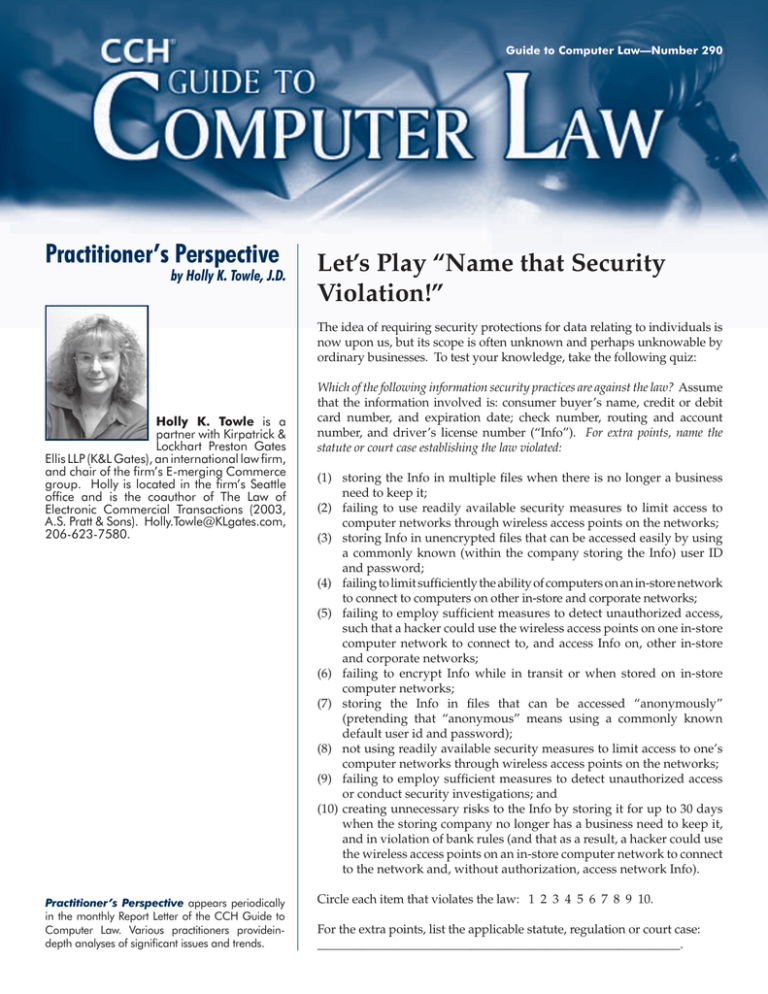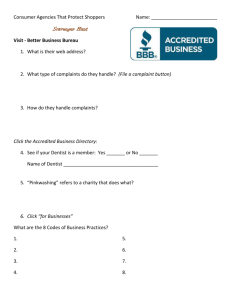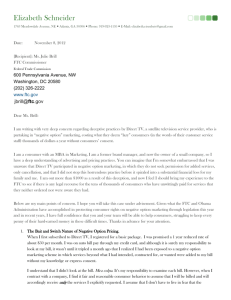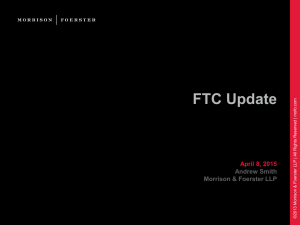Practitioner’s Perspective Let’s Play “Name that Security Violation!” by Holly K. Towle, J.D.
advertisement

Guide to Computer Law—Number 290
Practitioner’s Perspective
by Holly K. Towle, J.D.
Let’s Play “Name that Security
Violation!”
The idea of requiring security protections for data relating to individuals is
now upon us, but its scope is often unknown and perhaps unknowable by
ordinary businesses. To test your knowledge, take the following quiz:
Holly K. Towle is a
partner with Kirpatrick &
Lockhart Preston Gates
Ellis LLP (K&L Gates), an international law firm,
and chair of the firm’s E-merging Commerce
group. Holly is located in the firm’s Seattle
office and is the coauthor of The Law of
Electronic Commercial Transactions (2003,
A.S. Pratt & Sons). Holly.Towle@KLgates.com,
206-623-7580.
Practitioner’s Perspective appears periodically
in the monthly Report Letter of the CCH Guide to
Computer Law. Various practitioners provideindepth analyses of significant issues and trends.
Which of the following information security practices are against the law? Assume
that the information involved is: consumer buyer’s name, credit or debit
card number, and expiration date; check number, routing and account
number, and driver’s license number (“Info”). For extra points, name the
statute or court case establishing the law violated:
(1) storing the Info in multiple files when there is no longer a business
need to keep it;
(2) failing to use readily available security measures to limit access to
computer networks through wireless access points on the networks;
(3) storing Info in unencrypted files that can be accessed easily by using
a commonly known (within the company storing the Info) user ID
and password;
(4) failing to limit sufficiently the ability of computers on an in-store network
to connect to computers on other in-store and corporate networks;
(5) failing to employ sufficient measures to detect unauthorized access,
such that a hacker could use the wireless access points on one in-store
computer network to connect to, and access Info on, other in-store
and corporate networks;
(6) failing to encrypt Info while in transit or when stored on in-store
computer networks;
(7) storing the Info in files that can be accessed “anonymously”
(pretending that “anonymous” means using a commonly known
default user id and password);
(8) not using readily available security measures to limit access to one’s
computer networks through wireless access points on the networks;
(9) failing to employ sufficient measures to detect unauthorized access
or conduct security investigations; and
(10) creating unnecessary risks to the Info by storing it for up to 30 days
when the storing company no longer has a business need to keep it,
and in violation of bank rules (and that as a result, a hacker could use
the wireless access points on an in-store computer network to connect
to the network and, without authorization, access network Info).
Circle each item that violates the law: 1 2 3 4 5 6 7 8 9 10.
For the extra points, list the applicable statute, regulation or court case:
___________________________________________________________.
CCH GUIDE TO COMPUTER LAW
If you circled either (1) through (5) or (6) through (10) you
would be right, at least according to the Federal Trade
Commission (FTC). If you listed a statute, regulation or
court case setting out an obligation regarding any express
item, you would be wrong. Why? Because there are none.
If you circled some items but not others because you thought
of situations in which the behavior would be reasonable, you
would be right. And that is a problem: one cannot conform
behavior to legal requirements until one knows what those
requirements are. This premise, however, assumes that
a legal requirement exists; that is not the case for security
obligations for all U.S. companies in all circumstances or
even for the Info, notwithstanding the seemingly contrary
position of the FTC. When a legal obligation does exist, the
rules vary. And if the requirement is a general rule such
as for “reasonable” behavior or “fairness,” the required
behaviors will necessarily shift with circumstances and
subject matter so, again, a detailed list like that set out above
is not automatically meaningful.
The above list comes from two recent FTC enforcement
actions, both settled by consent orders without litigation.
The FTC alleged, respectively, that (1) through (5), and (6)
through (10), constituted a “failure to employ reasonable and
appropriate security measures to protect personal information
and files [that] caused or is likely to cause substantial injury
to consumers that is not offset by countervailing benefits to
consumers or competition and is not reasonably avoidable
by consumers. This practice was and is an unfair act or
practice.” Because of how the cases ended, we do not know
whether the FTC was right or wrong in concluding that an
unfair practice occurred. We do know that, using a general
deceptive and unfair practices statute, the FTC seems to have
found a heretofore unknown, federal, general obligation to
maintain security for personally identifiable data. The two
actions are In the Matter of DSW Inc., File No. 052 3096 (Dec.
2005) (items 1-5) and BJ’s Wholesale Club, Inc., FTC Docket
No. C-4148 (Sept. 2005)(items 6-10). To suddenly create and
enforce a list in hindsight as the FTC apparently did, is to
govern more by the concept of “shock and awe” than by
publicly considered and published public policy.
Because the actions were settled, no court will examine the
list or determine whether, under principles of due process
and the like, appropriate notice was provided of an actual
compliance obligation or whether imposing security
obligations under this statute exceeds FTC powers.
Security obligations of the type discussed here are emerging
from various sources. Irrespective of statutory or case law it is
prudent today to take care of information even if such is not
legally required. Also, certain federal laws generally require
reasonable care or the like to be taken by certain companies.
See e.g., the federal Gramm Leach Bliley Act re certain consumer
information held by defined “financial institutions,” and
the federal Health Insurance Portability and Accountability Act
NUMBER 290
of 1996 re security obligations of health care providers and
others within the law’s scope. Also a few states, such as
California, impose a general security obligation with respect
to defined “personal information” regarding CA residents.
Moreover, in some private contracts, such as “merchant
agreements” between a retailer and the processor to whom
the retailer turns in customer credit or debit card “slips,”
a merchant must take certain security measures and card
association rules require or encourage the bank or processors
to so contract. But at least one state, Washington, has
invalidated part of those merchant agreements as void
against public policy when they prevent retailers from
trying to obtain enough information to know with whom the
merchant is dealing.
The Washington action illustrates another thing that is wrong
with the FTC’s list. Even had the details been the subject
of public notice, some of the items on the list are wrong or
at least questionable. The FTC assumes that a “violation
of bank rules” justifies viewing the violation as an “unfair
act or practice.” But the rules that appear to be at issue are
the ones set forth in the merchant agreement between the
credit card processor and a retailer (BJ’s), a private contract.
Further, it is some of those very rules that at least one state—
Washington——views as void against public policy:
[T]he legislature finds that some retailers are deterred
from verifying their customers’ identity by contractual
arrangements with credit card issuers. The legislature
declares that such contracts violate the public policy
that all citizens should be able to take reasonable steps
to prevent themselves and their communities from
falling victim to crime.1
(1) Any provision of a contract between a merchant
or retailer and a credit or debit card issuer, financial
institution, or other person that prohibits the merchant
or retailer from verifying the identity of a customer
who offers to pay for goods or services with a credit or
debit card by requiring or requesting that the customer
present additional identification is void for violation of
public policy.2
Is Washington right in taking this action? California law
would say no—California prohibits merchants from taking
and/or recording certain verification steps3 But my point
concerns not who is right or wrong—the point is that the
varying approaches illustrate that little is commonly known
or agreed in this new area of information security and fraud
prevention. Thus, the FTC’s list assumes the existence of a
level of obviousness and transparency that does not exist.
Parts of the FTC’s list are simply wrong. Look at the allegation
that BJ’s “created unnecessary risks to the information by
storing it for up to 30 days when it no longer had a business
CCH GUIDE TO COMPUTER LAW
need to keep the information, and in violation of bank rules.”
There was a business need to keep at least part of the Info. For
one thing, the federal Truth in Lending Act (12 CFR § 226.13)
gives a credit card holder 60 days to dispute a transaction
and gives the card issuer another 90 days to investigate it
and make a reasonable determination regarding the validity
of the transaction. This investigation is done by contacting
the retailer and making it supply, essentially, proof that
the transaction occurred with the cardholder. The issuer
conducting the investigation might determine to side with
the cardholder and that will initially relieve the cardholder of
the repayment obligation. But that is not necessarily the end
of it. If the retailer does not agree with that determination,
the retailer can take it all up in court. How long does a court
action take? Several years in most states.
In short, there is a business need to keep Info for more than 30
days. BJ’s might have contracted for a shorter period with its
card processor, but likely not as to all Info (e.g., the merchant
agreement likely prohibited BJ’s from keeping the actual
credit card number). If BJ’s did so contract, or if “bank rules”
required BJ’s to do so, the Washington legislature would
have it right: how can fraud be prevented if insufficient
information about transactions may be retained in order to
prove the transaction when other rules require or allow such
proof? A potential collision exists between public policies
regarding the need to prevent identity theft and fraud on the
one hand, and to protect individual data on the other; this is
a train wreck waiting to happen and simplistic lists are not
helpful. A complex balancing of competing public policies
will be required to achieve any reasoned outcome.4
NUMBER 290
For example, the European Union recently amended a
directive5 to require telecommunication companies to retain
certain customer data for period of time longer (appx. 6 months
to 2 years) than the data was commonly being retained by
companies trying to comply with a countervailing, general
“don’t keep information too long” concept in EU law. Law
enforcement authorities were concerned that data was being
discarded too quickly for them to deal with crime or terrorism.
In short, public policies and reasonable minds differed as to
what was a reasonable time to keep the information. Yet the
FTC implies that answers are obvious. They are not.
Still, the list is an important indication of what the FTC thinks
is required to avoid unfair acts or practices. Accordingly,
businesses with Info may wish to consider and test
compliance with the list and give some thought to what will
be on the next list.
That can be the subject of our next guessing game.
ENDNOTES
1
2
3
4
5
WA Leg. 2003 c 89 § 1.
RCW 19.192.020(2003).
See CA Civ. Code § 1747.8.
For a discussion of this potential collision, see Raymond T.
Nimmer and Holly K. Towle, The Law of Electronic Commercial
Transactions (A.S. Pratt & Sons, 2003) at Chapter 15.06[1][b]
See e.g., Proposal for a Directive of the European Parliament and
of the Council on the retention of data processed in connection
with the provision of public electronic communication services
and amending Directive 2002/58/EC {SEC(2005) 1131}




